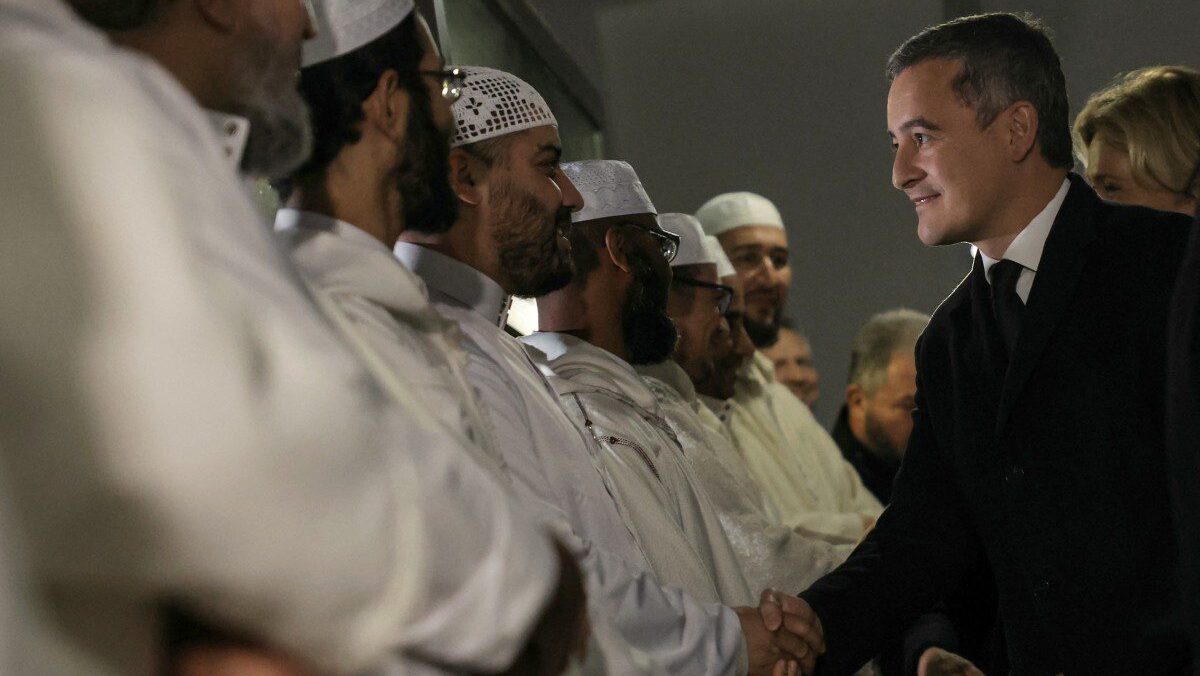
French Interior Minister Gerald Darmanin (R) meets with Imams as he arrives at Paris’ Great Mosque for a wreath laying ceremony to commemorate Muslim soldiers who died for France, at Paris’ Great Mosque on November 11, 2023.
Photo: Thomas SAMSON / AFP
From 1 January 2024, France will no longer accept the presence on its soil of ‘seconded imams,’ i.e., foreign imams who are paid by a foreign country but reside and officiate in France. The measure, designed to reduce the influence of foreign powers on France’s Muslim community, is gradually coming into force, with varying degrees of difficulty.
It was one of President Emmanuel Macron’s wishes, expressed in Mulhouse in February 2020 as part of the fight against “Islamist separatism.” At the time, Macron announced his desire to put an end to seconded imams sent by Muslim countries to officiate in France, so that they could be replaced by imams trained in France.
At the time of the Mulhouse announcement, there were around 300 seconded imams, out of a total of 2,700. Turkey, Algeria, and Morocco are the main countries providing seconded imams.
The measure has been slow to take effect. On 30 December 2023, a letter from the Ministry of the Interior put an end to the bilateral agreements that had existed with these countries since the 1990s, which had made it possible to ‘import’ foreign imams to meet the needs of Muslim believers. The only exception that will now be tolerated is the occasional arrival of ‘chanters,’ who are invited to France every year at Ramadan time—around 300 of them. Emmanuel Macron had announced that he wanted to put an end to these occasional ministers of the Muslim faith, but in the end, they will be authorised for a limited period.
In practice, applying the measure is not easy. There are no plans for seconded imams to be systematically sent back to their country of origin. If they wish, they may remain in France, provided they change their status before April 1st and become employees of the associations managing the places of worship. This is already the case, for example, for a number of imams of Moroccan origin working for the Union des Mosquées de France, which has been employing them since 2021.
The French government communicated energetically on the case of seconded imams, as proof of its determination to combat the mechanisms of Islamist radicalisation on French soil. But the reality is more complex, and they represent only one facet of the problem.
Seconded imams have been targeted by the French government as prime vectors of “Islamist separatism” because of their subservience to a foreign power. But according to Abdallah Zerki, vice-president of the French Council of Muslim Worship, they do not represent a real danger, as they are generally trained and well controlled by the countries that send them. Zerki is more wary of what he calls the “Google imams,” self-proclaimed preachers who come “to say and do what they want.” The same view is echoed by the imam of the Bordeaux mosque, who believes that today “separatism, fundamentalism and extremism are developing more on social networks than in mosques.”
In February, an imam of Tunisian origin, Mahjoub Mahjoubi, who officiates in Bagnols-sur-Cèze in the Gard region, made headlines with his particularly violent preaching calling for jihad, describing the French flag, for example, as a “satanic flag.” Interior Minister Gérald Darmanin eventually obtained his deportation to Tunisia. Mahjoubi was not a detached imam. He had been living in France for forty years, and in those forty years had never shown the slightest desire to integrate. Gérald Darmanin made an example of him by expelling him from France in record time, but his case clearly proves that the problem of radicalised imams goes far beyond the management of seconded imams.
Once seconded imams have been removed, two problems remain. The first is the training of imams, which the French government wants to see increasingly carried out in France, with training that “respects the laws and principles of the Republic”, which is far from being the case today. The second is foreign funding, which will continue regardless of the presence of foreign imams on French soil.
Today, imams working in French mosques do so mostly on a voluntary basis. The possibility of paying an imam depends on donations from the faithful, which are largely insufficient to cover the costs of hiring one. The Forum de l’Islam de France, which took over from the Conseil Français du Culte musulman, is working on a status of ‘imam of France,’ who would be an employee of the associations running the places of worship, but for the moment, no lasting project has come to fruition, and for good reason. The principle of French secularism, as defined by the 1905 law separating the Churches and the State, does not allow the state to intervene in the formation, operation, funding, or organisation of religious denominations. On the Left, there are calls for the 1905 law to be adapted in favour of Islam, on the grounds that the Muslim religion now occupies an essential place in French society, with a community of several million practising Muslims. On the Right, the Rassemblement National is calling for a drastic policy to break away from all forms of funding from Muslim countries, and to expel all imams likely to hold views incompatible with French civilisation.
